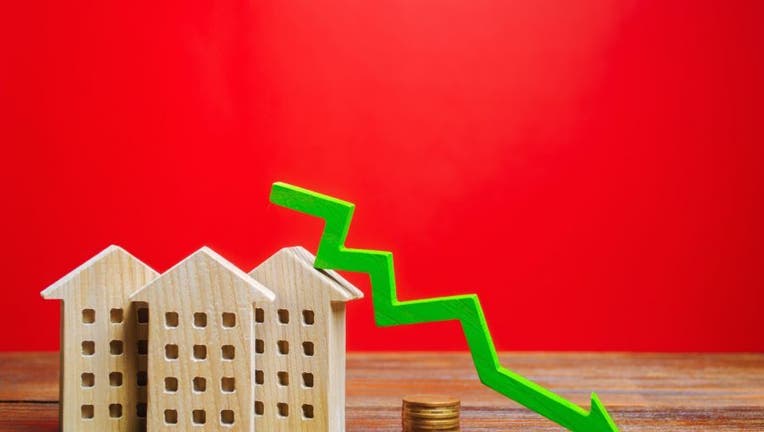Mortgage rates are going down — see how much you can save now

Scoring even a slightly lower interest rate could save you tens of thousands of dollars. (iStock)
The coronavirus pandemic has had a significant impact on the U.S. economy. Despite a drop in unemployment numbers in May to 13.3 percent, an estimated 21 million Americans are still out of work.
For some, however, the economic troubles could provide an opportunity to save on their mortgage. After the Federal Reserve slashed interest rates in March, banks and credit unions have followed suit, reducing interest rates on several loan types, including mortgages.
How far have mortgage rates dropped?
Homebuyers can take advantage of record-low rates to save on mortgages. You can use a refinancing calculator or fill out Credible's easy online form to get personalized rates within minutes and to discover potential savings.
MORTGAGE RATES HIT NEW RECORD LOW: HOW REFINANCING COULD SAVE YOU MORE MONEY
As of June 4, the weekly average rate is 3.18 percent for a 30-year fixed mortgage loan and 2.62 percent for a 15-year fixed loan, according to Freddie Mac. In contrast, the average rates for a 30-year and 15-year fixed mortgage a year ago were 3.82 percent and 3.28 percent, respectively.
These record interest rates provide mortgage borrowers with an opportunity to purchase a new home or refinance their current home loan at a lower rate. See what kind of rates you could get if you refinanced today.
WHY IT'S A GOOD IDEA TO REFINANCE YOUR MORTGAGE WHILE RATES ARE LOW
How much could a new 30-year mortgage save you?
If you were to refinance your current mortgage loan into a 30-year mortgage, it could significantly reduce how much you pay per month and in interest over the life of your loan.
To give you an idea of how much you can save, let’s say you have a 30-year mortgage with a $300,000 balance and a 3.82 percent interest rate. In this scenario, your monthly payment is roughly $1,401. But if you were to refinance the loan at a rate of 3.18 percent, your monthly payment would drop to about $1,294.
FED’S EMERGENCY RATE CUTS AFFECT MORTGAGES — HERE’S HOW YOU CAN BENEFIT
That $107 in monthly savings translates to $38,250 in total savings over 30 years, making it a no-brainer if you plan to stay in your home for a long time.
How low-interest rates could affect your 15-year mortgage
If you currently have a $300,000 15-year mortgage with a 3.28 percent interest rate, your monthly payment would be about $2,112. Refinance the loan at a 2.62 percent interest rate, and your monthly payment would be reduced to $2,017 for a monthly savings of $95.
SHOULD YOU REFINANCE INTO A 30-YEAR OR 15-YEAR MORTGAGE DURING CORONAVIRUS?
That may not seem like a lot compared to the total monthly payment. But over 15 years, those savings add up to $17,100 in total.
When it doesn’t make sense to refinance
While refinancing may offer some significant savings over a long period, it may not make sense if you’re not planning to stick around in the home for very long.
That’s because when you refinance your mortgage, lenders charge closing costs that can range from 2 to 6 percent of the loan amount. To make the refinance a good decision, you’ll need to live on the home long enough to make up for those upfront costs.
TODAY'S MORTGAGE RATES ARE ASTONISHINGLY LOW — HOW TO LAND THE BEST REFINANCE PRICE
For example, let’s say you have $10,000 in closing costs, and refinancing could save you $107 per month. You’d need to remain in the home for almost eight years just to break even. If you’re thinking about moving before then, you’ll save more by keeping your current mortgage.
Tips for maximizing your savings on a new loan
If you’re hoping to capitalize on low rates, here are some ways to ensure you save the most amount of money possible:
Shop around: No one lender has the best interest rates for everyone. Visit Credible to compare rates from multiple lenders in one place to get an idea of which one offers the best option for you. In addition to interest rates, also look at closing costs, fees and other features.
Improve your credit: The higher your credit score, the better your chances of getting approved for a low-interest rate. Take steps to improve your credit score before you apply.
Run the numbers: Once you know how much the new loan will cost you in closing costs and the monthly savings it’ll provide, run the numbers to find out how long it’ll take you to break even. If you’re planning to stay in your home longer than that, refinancing is a good choice.
The most important thing to remember is to avoid making an emotional decision about your mortgage. Take time to research your options and make sure it’s the best decision for you now and in the future.

